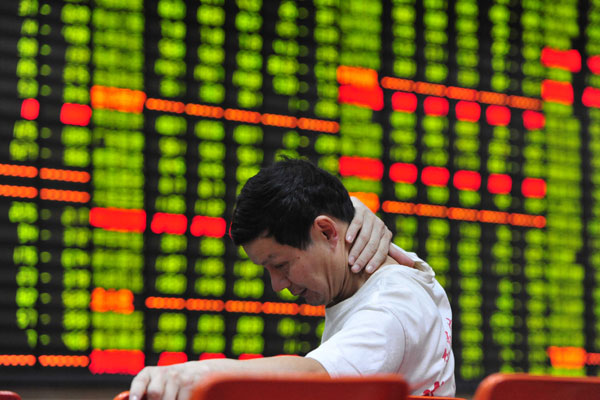Equities slump amid slow-growth estimates
Updated: 2013-06-14 01:55
By WANG YING in Shanghai (China Daily)
|
||||||||
|
 |
|
An investor sits in a brokerage office in Jiujiang, Jiangxi province, on Thursday, as mainland stocks plunged to the year's low. The losses followed several previous days of declines. HU GUOLIN / FOR CHINA DAILY |
Chinese shares dropped for an eighth consecutive day Thursday against a backdrop of unexpected economic weakness and concerns about possible capital flight, which have overshadowed Asian bourses for weeks.
Investor sentiment was further depressed by word of a resumption in initial public offerings, which many believe could depress market liquidity and put pressure on share prices.
The benchmark Shanghai Composite Index fell 2.83 percent, the biggest one-day fall since March 4, to 2,148.36 points, the year's low. The previous low was 2,174.12 on May 2. The Shenzhen index slipped 3.78 percent to 8,432.42.
Lackluster statistics released ahead of the Dragon Boat Festival (Monday to Wednesday) holiday showed the economy is growing more slowly than expected, said Zhang Qi, an analyst from Haitong Securities Co Ltd.
In May, industrial output expanded 9.2 percent year-on-year, down from April's 9.3 percent increase.
Exports edged up 1 percent to 1.14 trillion yuan ($185.8 billion), well below market expectations of 7.3 percent growth, while imports contracted 0.3 percent to 1.01 trillion yuan, missing market expectations of 6 percent growth.
The consumer price index, a main gauge of inflation, rose 2.1 percent year-on-year in May, slowing from 2.4 percent in April, and the producer price index, which measures inflation at the wholesale level, fell 2.9 percent year-on-year in May, both pointing to a sluggish end-user market.
The World Bank has cut its economic growth forecast for China to 7.7 percent in 2013 from an earlier projection of 8.4 percent, suggesting Chinese policymakers are looking to rebalance the nation's growth model.
The United States Federal Reserve Board is likely to gradually scale down and finally phase out the quantitative easing program as the US economy picks up, which means there will be much less "hot money" circulating in the stock market, said Wang Jianhui, chief economist with Southwest Securities Co Ltd.

 Michelle lays roses at site along Berlin Wall
Michelle lays roses at site along Berlin Wall
 Historic space lecture in Tiangong-1 commences
Historic space lecture in Tiangong-1 commences
 'Sopranos' Star James Gandolfini dead at 51
'Sopranos' Star James Gandolfini dead at 51
 UN: Number of refugees hits 18-year high
UN: Number of refugees hits 18-year high
 Slide: Jet exercises from aircraft carrier
Slide: Jet exercises from aircraft carrier
 Talks establish fishery hotline
Talks establish fishery hotline
 Foreign buyers eye Chinese drones
Foreign buyers eye Chinese drones
 UN chief hails China's peacekeepers
UN chief hails China's peacekeepers
Most Viewed
Editor's Picks

|

|

|

|

|

|
Today's Top News
Shenzhou X astronaut gives lecture today
US told to reassess duties on Chinese paper
Chinese seek greater share of satellite market
Russia rejects Obama's nuke cut proposal
US immigration bill sees Senate breakthrough
Brazilian cities revoke fare hikes
Moody's warns on China's local govt debt
Air quality in major cities drops in May
US Weekly

|

|







